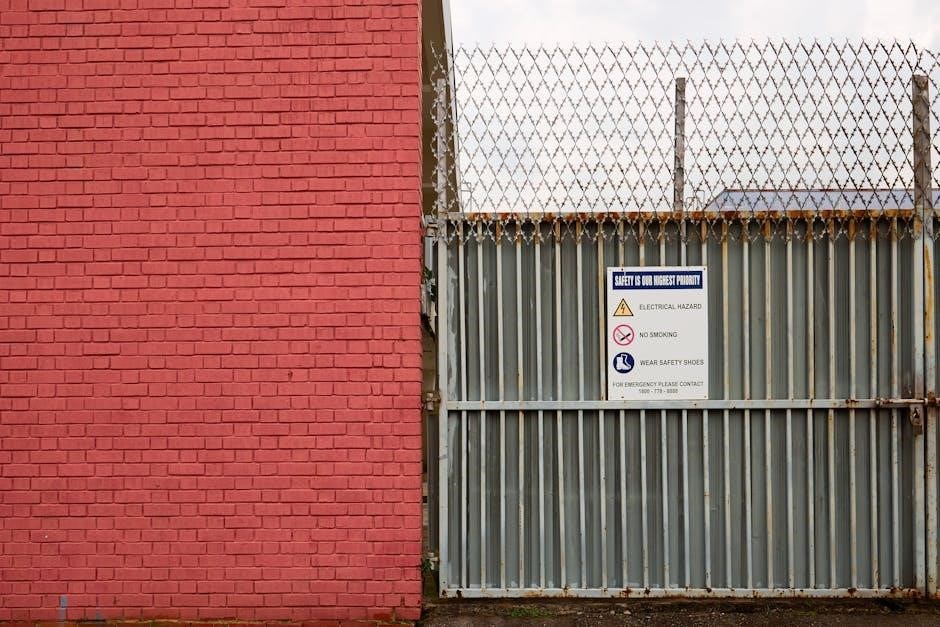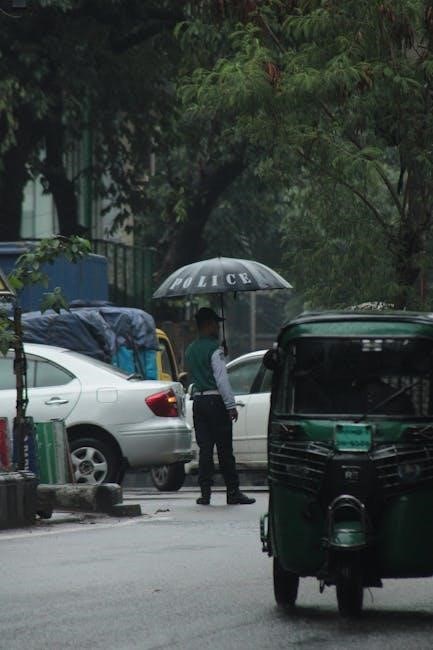Societal security addresses the protection of a society’s core values, identity, and institutions, ensuring stability and cohesion in the face of internal and external threats.
1.1 Definition and Scope of Societal Security
Societal security refers to the protection of a community’s identity, cultural integrity, and social cohesion. It encompasses measures to safeguard institutions, values, and norms from threats like cyberattacks, scams, and political polarization. The scope includes ensuring data privacy, combating misinformation, and fostering trust in organizations. It balances security with individual freedoms, addressing both physical and psychological safety. Societal security is vital for maintaining stability and resilience against evolving threats, ensuring a cohesive and secure environment for all members of society.
1.2 Importance of Societal Security in Modern Society
Societal security is crucial for maintaining stability, trust, and cohesion in modern society. It protects core values, cultural identity, and institutions from threats like cyberattacks, misinformation, and polarization. By ensuring data privacy and combating scams, societal security fosters a resilient environment where individuals and communities can thrive. Neglecting societal security can lead to social unrest, eroded trust, and instability. A secure society promotes cooperation, innovation, and progress, safeguarding the well-being of its members and supporting long-term prosperity.

Historical Context of Societal Security
Societal security evolved from ancient concepts of community protection to modern frameworks addressing threats like cyberattacks and misinformation, reflecting societal values and challenges over time.
2.1 Evolution of Societal Security Concepts
The concept of societal security has evolved significantly, transitioning from ancient notions of communal protection to modern frameworks addressing identity, culture, and technological threats. Historically, societal security focused on physical protection and territorial integrity, but it has expanded to encompass intangible elements like cultural identity and social cohesion. The Cold War era introduced the idea of societal security as a distinct concept, emphasizing the protection of shared values and institutions. Today, it adapts to challenges like globalization, cyber threats, and misinformation, reflecting the dynamic nature of societal risks and the need for holistic security strategies.
2.2 Key Historical Events Shaping Societal Security
Historical events have profoundly shaped societal security, from the Cold War’s ideological conflicts to modern cyber threats. The 9/11 attacks highlighted the vulnerability of societies to terrorism, prompting enhanced counterterrorism measures. The 2008 financial crisis underscored the impact of economic instability on social cohesion. Recent events like the COVID-19 pandemic and large-scale cyberattacks have expanded societal security to include health and digital infrastructure. These events have led to the development of comprehensive frameworks addressing both traditional and emerging threats, emphasizing the need for adaptive strategies to safeguard societies’ core values and institutions.
Components of Societal Security
Societal security encompasses cultural identity, social cohesion, and institutional stability. It addresses threats to shared values, community bonds, and structural frameworks, ensuring a resilient society.
3.1 Identity and Cultural Security
Identity and cultural security are crucial for societal cohesion. They involve protecting a society’s cultural heritage, traditions, and values from erosion or external influences. A strong cultural identity fosters unity and resilience, enabling societies to maintain their distinctiveness in a globalized world. Threats such as cultural homogenization and social fragmentation can undermine this security, leading to divisions and instability. Ensuring cultural security requires policies that promote diversity and inclusion while preserving core values, thereby safeguarding the collective identity that defines a society’s sense of self and belonging.
3.2 Community and Social Cohesion
Community and social cohesion are vital for societal security, fostering trust and collaboration among diverse groups. Strong social bonds reduce conflicts and enhance collective well-being. Factors like inclusive policies, education, and dialogue promote unity, while economic inequality and discrimination can erode cohesion. Building resilient communities ensures societies can withstand challenges, maintaining stability and harmony. Effective strategies focus on empowering communities and addressing disparities, ensuring all members feel valued and connected, which is essential for long-term societal security and prosperity.
3.3 Institutional and Structural Stability
Institutional and structural stability are cornerstone elements of societal security, ensuring the effective functioning of governance, legal systems, and public services. These structures provide the framework for maintaining order, protecting rights, and delivering essential services. A stable institutional environment fosters trust and legitimacy, which are critical for societal resilience. Strong legal frameworks, transparent governance, and robust infrastructure contribute to long-term stability. Additionally, institutions play a key role in mitigating risks such as cyber threats and data breaches by implementing safeguards and promoting collaboration. Stable institutions ensure continuity and adaptability, enabling societies to address challenges while maintaining social order and security.
Threats to societal security include cyber attacks, political polarization, social inequality, and cultural erosion, which undermine stability and cohesion in modern societies. Cyber threats and data breaches pose significant risks to societal security by compromising personal data, disrupting critical infrastructure, and undermining trust in institutions. Cybercriminals exploit vulnerabilities in digital systems, leading to unauthorized access, identity theft, and financial fraud. Data breaches, particularly in sectors like healthcare and finance, can have far-reaching consequences, exposing sensitive information and threatening individual privacy. These attacks not only erode public confidence but also create challenges for governments and organizations to ensure robust cybersecurity measures. Addressing these threats requires a multi-faceted approach, including advanced security technologies and public awareness campaigns. Globalization, while fostering economic and cultural exchange, often leads to cultural erosion, threatening societal security by diluting unique traditions and identities. The homogenization of cultures, driven by global media and consumerism, can weaken social cohesion and collective identity. Local practices and languages may fade as dominant cultures gain prominence, leading to a loss of cultural diversity. This erosion can spark tensions, as communities resist external influences, potentially destabilizing societal structures. Balancing globalization’s benefits with the preservation of cultural heritage remains a critical challenge for maintaining societal security and fostering inclusive, resilient societies. Social media has become a battleground for information warfare, threatening societal security by spreading disinformation and amplifying polarization. Platforms like Facebook and Twitter are exploited to manipulate public opinion through fake news, deepfakes, and targeted propaganda. These tactics undermine trust in institutions, sow discord, and erode social cohesion. Cyberattacks and state-sponsored campaigns further exacerbate these issues, creating echo chambers that deepen divides. The misuse of social media poses significant risks to democratic processes and collective security, necessitating robust countermeasures to combat misinformation and protect societal stability in the digital age. Economic inequality is a significant threat to societal security, as it fosters social unrest by creating disparities in wealth, access to resources, and opportunities. When certain groups feel marginalized or excluded, it can lead to widespread dissatisfaction, protests, and even violence. This instability undermines societal cohesion and trust in institutions. Addressing economic inequality through policies like progressive taxation, social welfare programs, and equitable education can help mitigate these risks, ensuring a more stable and harmonious society. Ignoring these issues risks deepening divisions and threatening long-term societal security. Political polarization and extremism pose significant threats to societal security by dividing societies and undermining democratic institutions. Polarization fosters “us versus them” mentalities, eroding trust in governance and exacerbating tensions. Extremist ideologies often exploit these divisions, leading to radicalization and violence. Such dynamics can destabilize communities, weaken social cohesion, and create an environment conducive to conflict. Addressing these challenges requires promoting inclusive dialogue, combating misinformation, and strengthening democratic values. Without intervention, political polarization and extremism can fracture societies, making them more vulnerable to internal and external threats, ultimately jeopardizing long-term stability and security. Legal frameworks include international laws, national policies, and law enforcement agencies, ensuring societal stability and cohesion by addressing security threats and protecting core values. International laws and treaties form the backbone of societal security by establishing global standards for human rights, sovereignty, and conflict resolution. Treaties like the Universal Declaration of Human Rights and the UN Charter promote stability and justice. These frameworks address cybersecurity, terrorism, and data protection, ensuring cross-border cooperation. They also outline measures to protect cultural identity and societal cohesion, fostering a unified approach to security challenges. Compliance with these treaties is essential for maintaining trust and collaboration among nations, ensuring a safer and more stable global community. Their implementation is monitored by international bodies, fostering accountability and adherence to agreed-upon standards. National policies and regulations are critical for safeguarding societal security by addressing domestic threats and ensuring the well-being of citizens. Governments implement laws to protect identity, institutions, and social fabric. These policies often focus on data protection, cybersecurity, and cultural preservation. They also aim to mitigate risks like economic inequality and social unrest. Legal frameworks ensure public services are reliable and inclusive, fostering social cohesion. Regulations adapt to emerging threats, such as cyberattacks and misinformation, to maintain societal stability. By aligning with international standards, national policies promote a secure and resilient society, addressing contemporary challenges effectively. Law enforcement agencies play a pivotal role in maintaining societal security by enforcing laws, preventing crimes, and responding to threats. They protect identity, community cohesion, and institutional stability, ensuring public safety. Agencies collaborate with governments to address risks like social unrest and extremism. By upholding legal frameworks and safeguarding data, they foster trust and resilience. Their efforts are crucial in mitigating threats to cultural and social fabrics, ensuring a stable society. Effective law enforcement is essential for preventing cyber threats and misinformation, which are critical to societal security in the modern era. Technological advancements like AI, blockchain, and cybersecurity tools enhance societal security by protecting data, preventing threats, and ensuring stability in modern societies. Artificial intelligence (AI) significantly enhances societal security through advanced surveillance systems, enabling real-time monitoring and threat detection. AI-powered tools analyze vast datasets to identify patterns, predict potential risks, and improve response times. Facial recognition, license plate identification, and behavioral analysis are key applications. However, the use of AI in surveillance raises ethical concerns, such as privacy violations and bias in algorithms. Balancing security benefits with civil liberties remains a critical challenge. transparent policies and robust oversight are essential to ensure ethical deployment and public trust in AI-driven surveillance systems. This duality underscores the need for careful implementation and regulation. Blockchain technology offers robust solutions for data protection, enhancing societal security by ensuring secure and tamper-proof transactions. Its decentralized nature prevents single-point failures, safeguarding sensitive information from cyber threats and breaches. Encryption and consensus mechanisms ensure data integrity and authenticity. Applications in identity verification, supply chain management, and healthcare records demonstrate its potential. By minimizing centralized vulnerabilities, blockchain fosters trust and resilience in critical systems, making it a cornerstone of modern data security strategies. Its adoption is pivotal in addressing emerging threats and maintaining societal trust in digital infrastructure. Cybersecurity measures and tools are essential for safeguarding digital infrastructure and protecting sensitive data. Firewalls, encryption, and antivirus software are fundamental defenses against cyber threats. Advanced tools like intrusion detection systems and SIEM (Security Information and Event Management) systems monitor and respond to threats in real-time. Multi-factor authentication (MFA) enhances access security, while regular software updates and patches mitigate vulnerabilities. These tools collectively ensure data integrity, prevent breaches, and maintain public trust in digital systems, which are critical for societal security and stability in an increasingly connected world. Public perception and awareness are vital for societal security, as they shape collective resilience and trust in institutions, influencing how threats are understood and addressed. Understanding societal security risks involves recognizing threats to cultural identity, social cohesion, and institutional stability. These risks include cyberattacks, misinformation, and economic disparities, which can erode trust and unity. Public awareness campaigns play a crucial role in educating individuals about these risks. By fostering a collective understanding, societies can better prepare for and respond to challenges, ensuring resilience and stability. Awareness also empowers individuals to contribute to societal security through informed decisions and active participation. Addressing these risks requires a comprehensive approach that integrates education, policy, and community engagement. Education plays a pivotal role in fostering societal security by equipping individuals with the knowledge and skills to recognize and address threats. It promotes critical thinking, enabling people to discern misinformation and make informed decisions. Educational programs can integrate societal security concepts, encouraging awareness of cultural identity, social cohesion, and institutional stability. By fostering a sense of responsibility and civic engagement, education empowers individuals to contribute to community resilience. Moreover, it helps bridge social divides, reducing vulnerabilities to polarization and extremism. Thus, education is a cornerstone in building a secure and cohesive society, ensuring long-term stability and prosperity. Media significantly influences public perception of societal security, shaping attitudes toward identity, stability, and threats. It can amplify awareness of critical issues but also spread misinformation, fueling polarization. Sensationalized coverage may distort realities, while biased narratives can deepen divisions. Conversely, responsible media fosters informed discourse, promoting cohesion. The portrayal of events directly impacts trust in institutions and social unity. As a result, media literacy is essential to discern factual information from manipulation. Ethical journalism plays a vital role in maintaining societal security by ensuring the public receives balanced, accurate reporting, thereby strengthening resilience against misinformation and fostering a more informed, secure society. Case studies highlight real-world applications of societal security measures, showcasing successes in combating threats, enhancing community resilience, and rebuilding trust in institutions through effective strategies. Successful societal security measures often involve multi-faceted approaches, combining education, policy enforcement, and community engagement. For instance, nations that prioritize cultural preservation alongside technological advancement have seen reduced threats to social cohesion. Public awareness campaigns about cyber threats have significantly lowered data breach incidents. Additionally, policy frameworks emphasizing inclusivity and equality have mitigated social unrest, fostering a sense of shared identity and stability. These examples demonstrate that integrated strategies yield long-term benefits, ensuring societal security without compromising individual freedoms or innovation. Such implementations serve as models for other regions striving to enhance their security frameworks. Despite efforts to enhance societal security, failures have highlighted critical gaps. For instance, the 2020 data breaches exposed weaknesses in cybersecurity measures, emphasizing the need for stronger protocols. Similarly, social media platforms have struggled to curb misinformation, leading to polarized communities. Lessons learned include the importance of proactive user education and robust institutional preparedness. Failures also underscore the need for adaptive strategies to address evolving threats. By analyzing these shortcomings, societies can refine their approaches, fostering resilience and better safeguarding against future challenges. These insights are invaluable for shaping effective societal security frameworks. A comparative analysis of societal security across nations reveals diverse approaches and outcomes. Nordic countries excel in community cohesion and trust, while others, like Japan, prioritize technological solutions. The U.S. focuses on legal frameworks and surveillance, whereas developing nations often face challenges in balancing security with limited resources. Common themes include the struggle to adapt to cyber threats and the importance of public awareness. Lessons from these comparisons highlight the need for tailored strategies, international collaboration, and continuous adaptation to evolving threats. This analysis provides valuable insights for enhancing societal security globally, emphasizing the importance of cultural and contextual understanding. Future trends in societal security include advancements in AI, enhanced data protection measures, and increased global collaboration to combat evolving threats effectively. Emerging technologies like AI, blockchain, and advanced cybersecurity tools are reshaping societal security. AI enhances surveillance and data analysis, while blockchain ensures secure transactions. These innovations protect identities, prevent cyber threats, and maintain social stability. However, they also introduce risks, such as AI biases and data misuse. Governments and organizations must adapt these technologies responsibly to address societal security challenges effectively. Balancing innovation with ethical considerations is crucial for fostering trust and safeguarding communities in the digital age. These advancements promise to strengthen societal resilience against evolving threats. The nature of threats to societal security is evolving rapidly, driven by technological advancements and global interconnectedness. Cyber-attacks, misinformation, and social media manipulation are becoming more sophisticated, targeting the fabric of society. Responses must adapt to these dynamic threats, leveraging AI, blockchain, and advanced cybersecurity tools. Governments and organizations are increasingly adopting proactive measures, such as data protection laws and public awareness campaigns. Collaboration between nations and sectors is critical to address these challenges effectively. The balance between innovation and security remains a key focus in mitigating risks and ensuring societal resilience in the face of ever-changing threats. Global collaboration is essential for addressing societal security challenges, as threats like cyber-attacks and misinformation transcend borders. International agreements and treaties play a crucial role in fostering cooperation. Organizations like the United Nations and EU agencies work to harmonize policies and share strategies. Cross-border data protection laws, such as GDPR, exemplify this cooperation. Public-private partnerships are also vital, combining governmental oversight with corporate innovation. Educating citizens globally about security risks enhances collective resilience. By uniting efforts, nations can effectively counter evolving threats and ensure a safer, more stable future for all societies. Societal security is vital for protecting core values and ensuring stability, addressing threats like cyber-attacks and misinformation through global cooperation and adaptive strategies. This report provides a comprehensive analysis of societal security, emphasizing its critical role in safeguarding core values, identity, and institutions. It explores the evolution of societal security concepts, key historical events, and modern threats such as cyber-attacks and misinformation. The report highlights the importance of legal frameworks, technological advancements, and public awareness in addressing these challenges. Case studies illustrate successful strategies and lessons learned, while future trends emphasize the need for global collaboration and adaptive measures. Ultimately, societal security requires a multifaceted approach to ensure long-term stability and resilience in an ever-changing world. Implementing robust societal security measures requires collective effort. Governments must strengthen legal frameworks and invest in advanced technologies like AI and blockchain for data protection. Public awareness campaigns should educate communities on identifying threats and fostering social cohesion. Collaboration between nations is essential to address global challenges. Organizations must prioritize data security and ethical practices to build trust. Individuals should stay informed and proactive in safeguarding their digital footprint. By uniting efforts, we can create a resilient society capable of overcoming contemporary and future threats, ensuring a secure and stable world for generations to come. Explore academic papers, government reports, and books on societal security, including “Understanding Supplemental Security Income (SSI)” and publications from the Joseph Rowntree Foundation. Academic sources provide in-depth insights into societal security. The Joseph Rowntree Foundation offers research on poverty and societal resilience. Heather Cox Richardson’s historical analyses explore societal stability. Key papers include “Societal Security in the Digital Age” and “Community Cohesion and Security,” addressing identity, technology, and policy impacts. These resources are essential for understanding the interdisciplinary nature of societal security, offering empirical data and theoretical frameworks for scholars and policymakers. They highlight the importance of addressing threats like cyber risks and social inequality to maintain societal stability and cohesion in a rapidly changing world. Governments worldwide publish reports and policies addressing societal security. The U.S. Social Security Administration outlines measures to combat identity theft and fraud. The Department of Defense (DOD) drafts policies to protect sensitive information. Reports highlight the importance of data security and privacy laws. These documents emphasize the need for robust cybersecurity frameworks and public awareness campaigns. For instance, policies on Social Security imposter scams provide guidelines to safeguard citizens. Such reports underscore the role of governance in maintaining societal stability and trust, offering actionable strategies to mitigate risks and ensure long-term security for communities and institutions. For deeper insights into societal security, key books include “The Digital Security Handbook” and “Privacy in the Modern Age,” which explore data protection and identity theft. Articles like “Societal Security in the Digital Era” and “Cybersecurity Frameworks for Modern Societies” provide practical guidance. These resources offer comprehensive analyses of threats, legal frameworks, and technological solutions. They are essential for understanding the evolving landscape of societal security and implementing effective strategies to safeguard communities and institutions. These works are invaluable for policymakers, researchers, and the general public seeking to enhance societal resilience.
Threats to Societal Security
4.1 Cyber Threats and Data Breaches
4.2 Globalization and Cultural Erosion
4.3 Social Media and Information Warfare
4.4 Economic Inequality and Social Unrest
4.5 Political Polarization and Extremism

Legal and Policy Frameworks
5.1 International Laws and Treaties
5.2 National Policies and Regulations

5.3 Role of Law Enforcement Agencies

Technological Advancements and Societal Security
6.1 Artificial Intelligence and Surveillance
6.2 Blockchain and Data Protection
6.3 Cybersecurity Measures and Tools
Public Perception and Awareness
7.1 Understanding Societal Security Risks
7.2 Role of Education in Societal Security
7.3 Media’s Impact on Public Perception

Case Studies and Examples
8.1 Successful Implementation of Societal Security Measures
8.2 Failures and Lessons Learned

8.3 Comparative Analysis of Different Countries

Future Trends in Societal Security
9.1 Emerging Technologies and Their Impact
9.2 Changing Nature of Threats and Responses
9.3 Global Collaboration and Cooperation
10.1 Summary of Key Points
10.2 Call to Action for Enhanced Societal Security

References and Further Reading
11.1 Academic Sources and Research Papers
11.2 Government Reports and Policies
11.3 Recommended Books and Articles